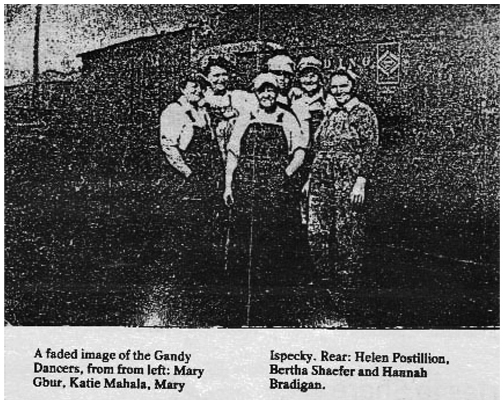In 1942, as men were leaving for war, Mary Gbur put aside her apron and good shoes for overalls and “clodhoppers.” Such was the uniform of a “Gandy Dancer” aboard the Reading Railroad in Tamaqua.
For the next four years, the Coaldale native cleaned ties and stuffed rocks under railroad sills. It was backbreaking work and only a handful of women made it through the first harsh winter.
The female laborers were known as Gandy Dancers, a term coined by the Gandy Manufacturing Company of Chicago, Illinois, in 1923.
But there was hardly anything to tap their toes over, except the higher-than-usual wages—about $55 a week.
“Money was short and I wanted to help my children continue their education after high school,” said Mrs. Gbur, who now lives with her daughter in Laurel, Mississippi. “And the railroad beat the $18 a week the dime store paid.”
Nevertheless, gandy dancing was not an easy way to make a living. First was the problem of getting there. The three women from Coaldale, Mary Ispecky, Katie Mahala and Mary Gbur, found it necessary to travel by bus daily to Tamaqua. When the ladies had to report to work before the bus made its first run in the morning, arrangements were made to ride to Tamaqua in a milk truck. Rudy Bartol, an employee for the Pisklak Dairy in Coaldale, went to Tamaqua early each morning to pick up milk from Orwigsburg farmers. In exchange for the daily ride each lady gave Bartol a package of cigarettes weekly (worth about 16 cents) which came from the family allotment of rationing stamps.
Troop trains frequently passed through the area. Soldiers going to various camps were given cookies and gifts from the workers and the local folk. Returning soldiers usually did the giving of souvenir items or candy to those who were at the station. Many tears were shed at both incoming and outgoing trains.
“The work was gruesome and boring,” said Mrs. Gbur, and “railroad passes did give us the opportunity to view life outside of Panther Valley.”
When it became necessary to clean up the area around the QA office, the center of Tamaqua, heads were rarely lifted to avoid the gaze of “scoffers.”
One day attitudes changed when a voice boomed out, “I am sure proud of you ladies!” Looking up, the ladies recognized the local parish priest and thanked him for the kind words, which were so desperately needed in those days.
After the war, when servicemen returned to reclaim their railroad jobs, the female “I’ve Been Working on the Railroad” era came to an end.

